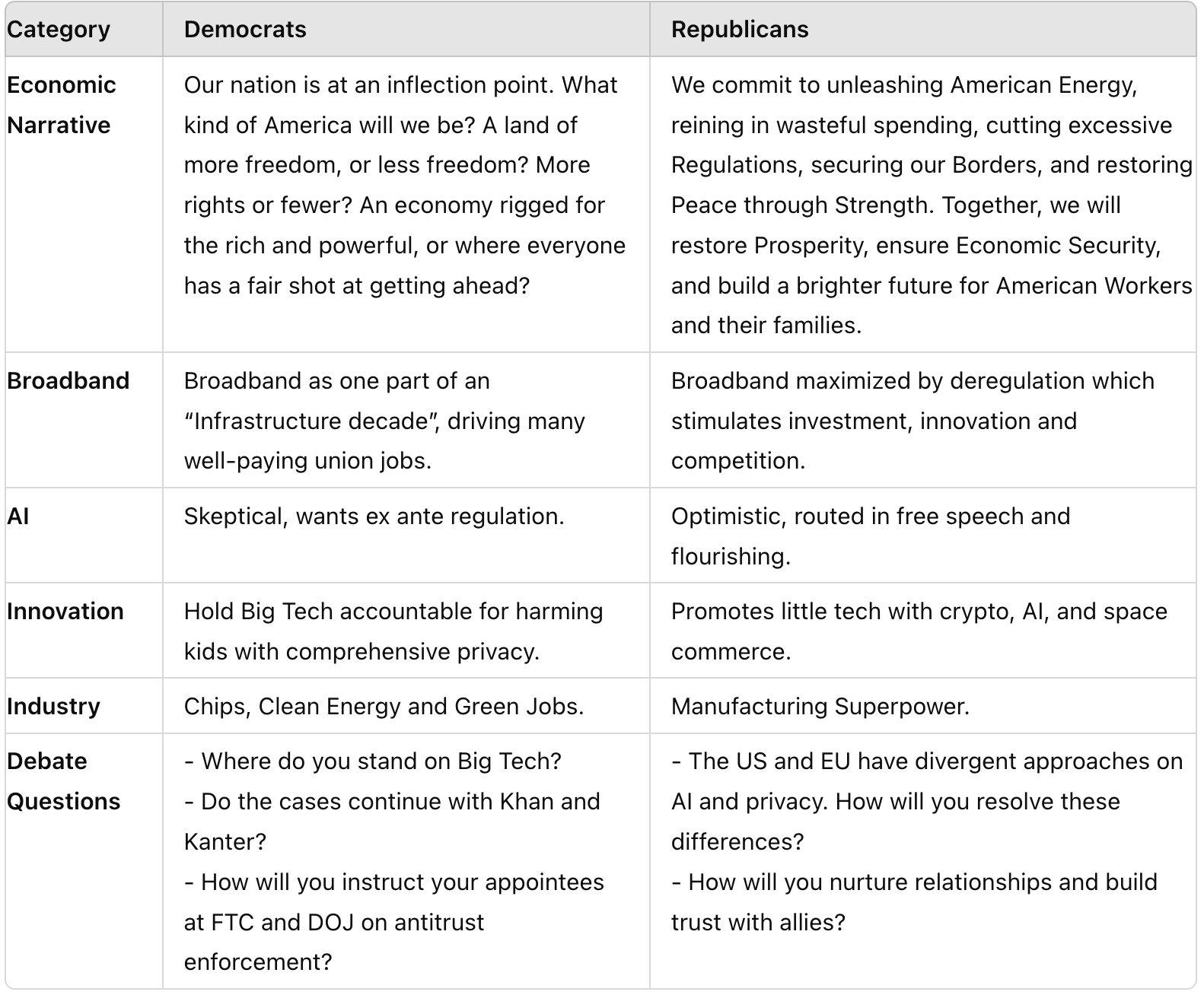
This piece originally appeared in Broadband Breakfast.
The world is watching America’s presidential election November 5, and tonight’s debate may be the only face-off between candidates current Vice President Kamala Harris and former President Donald Trump.
Elections are driven by pocketbook issues with the policy spade work on tech and telecom happening in between elections. Much of it is bipartisan, like the U.S. Senate Universal Service Fund Working Group. However, the biggest disappointment of this election season is that neither side has discussed the allocation of radio spectrum, the single most consequential issue in telecommunications policy with implications for national security, regulatory accountability, and billions of dollars of economic impact if allocated competitively.
In any event, it’s valuable to study the respective party platforms over time and compare them to each other. The parties remix, reboot, and rebrand each other’s ideas. For example, Democrats have recovered “freedom” as a theme for their campaign, the longtime Republican refrain.
Meanwhile, the GOP bills itself as the party of innovation and Little Tech, reclaiming salted ground from the techlash. Similarly, the parties promote different industries. For Democrats, it’s about chips and Green Energy. Republicans pledge to make the USA a Manufacturing Superpower. (Check out John Gardner’s Manufacture Local for the blueprint on revitalizing manufacturing and its benefits for workers, security, the city, and nation.) Title II net neutrality was a pillar of the DNC for years, but there is no mention of it in 2024.
Democrats
Notably the incumbent party can use their platform to tout their Presidential accomplishments. Indeed, Democrats do that on broadband infrastructure and their signature achievement, the Affordable Connectivity Program. ACP has connected some 23 million American households and is broadly embraced by both parties with recognition that broadband can for reduce inequality and enable personal upward mobility.
Reportedly, broadband is part of Harris’ Vice Presidential portfolio, though she has yet to mention it on the campaign trail. It could be related to delays and reported inefficiencies on the $42.5 billion BEAD (Broadband Equity and Access Deployment) program.
A key debate question for Harris is where she stands on Big Tech; the Californian has raked in record support from 500 venture capitalists. This contrasts with her party platform recounting of the Biden-Harris Administration “holding Big Tech accountable” and its considerable antitrust enforcement. The DNC platform hammers tech companies on “technology-facilitated abuse,” promotion of hate speech, harming mental health, fentanyl, excluding competitors, and undermining consumers and innovation.
It advocates for protecting kids online and strengthening data privacy; Democrats’ child privacy bill passed the Senate and is now in the House. Democrats also call for fundamental reform of Section 230 and strong regulation of Artificial Intelligence (AI).
Republicans
Comparing the 2024 platform to 2020, Republicans cut the length in half and summarize their objectives in 20 points, each which can be printed on a bumper sticker, a winning Obama era tactic. Key GOP themes include “Defeat Inflation”, “Make America Affordable Again”, “No Tax on Tips”, “Rebuild Our Cities”, and “Protect Seniors.”
The 2020 platform mentioned the internet more than two dozen times and noted Trump Administration accomplishments on winning the race to 5G, restoring and protecting internet freedom, creation of the Space Force and being the first to name AI and quantum information science as national research and development priorities. However ,“broadband”, “internet”, and “FCC” are not mentioned in 2024.
The GOP platform stakes out 3 tech priorities; “stopping the unlawful and unAmerican Crypto crackdown”; supporting “AI Development rooted in Free Speech and Human Flourishing” (Trump at 18 min notes that AI requires massive energy investment), and Space Commerce.
Broadband Breakfast has covered how the Vice Presidential candidates have telecom policy bonafides, like Ohio Senator J.D. Vance being a sponsor of a bill to preserve the Affordable Connectivity Program and Governor Mike Walz singing a municipal broadband bill into law.
They will debate on October 1 in New York.
Following is a brief comparison of the parties on key tech and telecom issues.

For comprehensive election information on both parties, check out the American Presidency Project at the University of California Santa Barbara with archived documents on campaigns, conventions, platforms, transitions, and transcripts from US Presidential debates since 1960. Check out Roslyn Layton’s election coverage at Strand Consult and her long read on tech policy and the parties.
